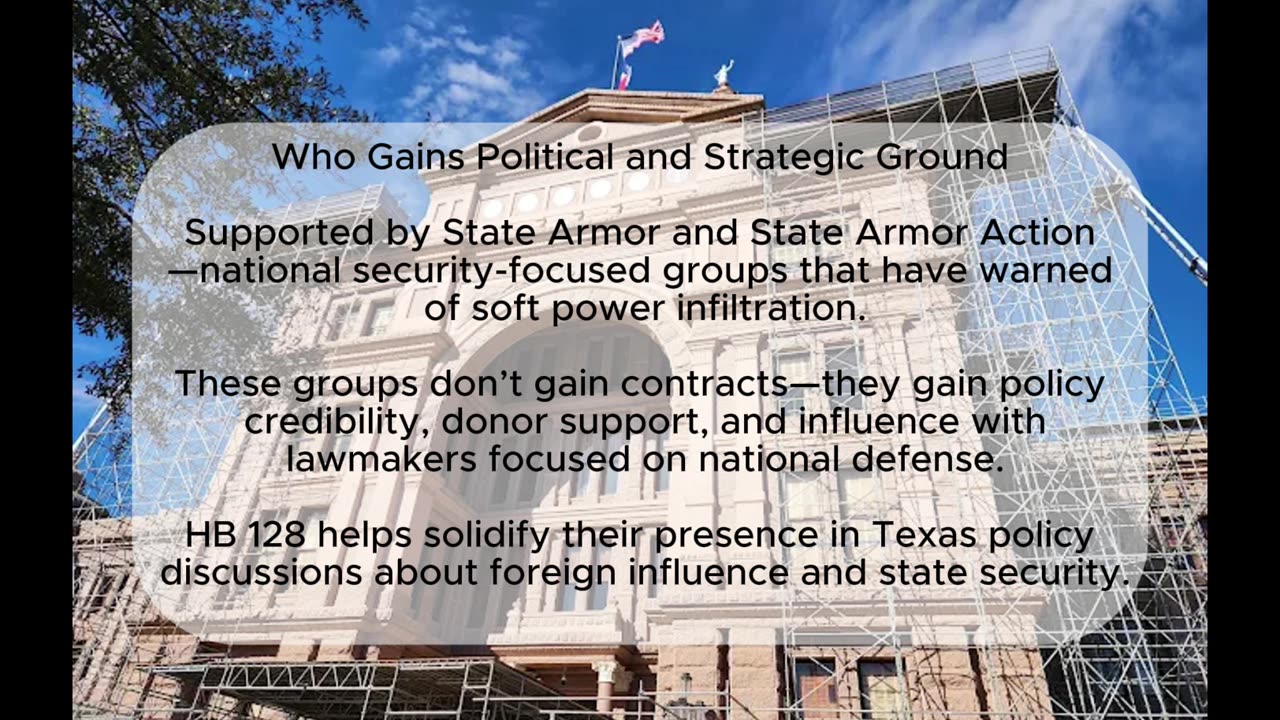Premium Only Content

HB 128
"✅ HB 128 – Texas Just Drew a Line on Sister Cities, and It Makes Sense Given the World We’re In
Some bills are hard to swallow because of what they stop, not what they build. HB 128 is one of those bills.
Here’s what it does:
HB 128 blocks Texas state agencies and local governments from entering into sister-city agreements with countries officially labeled as foreign adversaries—like China, Iran, North Korea, and Russia. If your city already has one of these relationships, it must cancel it by October 1, 2025.
The goal? To keep cultural exchange from becoming a backdoor for foreign political influence.
And here’s why it matters:
This bill doesn’t come out of nowhere. Federal agencies have warned that organizations tied to the Chinese Communist Party have used sister-city programs to influence local leaders, sometimes quietly shaping contracts, academic ties, and even tech access.
At the same time, Texas has already started cracking down on international gift-giving in schools and universities—because too many backroom deals and soft-influence plays were getting buried under “cultural partnership” language.
HB 128 connects that same logic to city governments.
Who’s behind it?
The bill was pushed by Rep. Orr and supported by groups like State Armor and State Armor Action—national security-focused organizations that track foreign interference campaigns at the local level. Supporters testified that it was time to take sister-city influence more seriously in light of espionage tactics being used under the radar.
Who benefits?
✅ Texans who want clean lines between diplomacy and influence
✅ Local leaders who don’t want to get played by foreign actors
✅ Students and universities who deserve programs without hidden agendas
What changes?
Before this bill, local governments could make sister-city agreements with just about anyone, as long as it looked good on paper. Now there’s a legal check—if the other country’s working against us strategically, Texas cities can’t keep pretending it’s just cultural.
What’s left out?
This bill doesn’t include a review board or a formal reevaluation timeline. That means once a country is on the banned list, they stay there until the Legislature says otherwise. There’s no built-in way to revisit the designation if things improve.
That said, the logic is sound: if a country’s openly hostile to the U.S.—militarily, politically, or economically—Texas shouldn’t be signing symbolic goodwill deals behind the scenes. This isn’t about shutting doors on peace. It’s about not pretending peace exists when it doesn’t.
Bottom line:
HB 128 isn’t flashy, but it’s part of a broader pivot Texas is making toward protecting itself from international pressure—whether it comes as a gift, a contract, or a handshake across the Pacific. It’s a clean restriction, backed by real-world warnings, and aligned with current threats.
It’s not a feel-good bill. But it’s a reality-check bill. And right now, that’s what we need more of.
Quick ask, y’all—likes help the algorithm, but shares are what get the truth out.
If this bill affects you, your kids, your patients, your neighbors—please share it.
Too many Texans don’t know what’s being signed into law. And if we don’t share it, they won’t hear it. These bills move quietly. The consequences don’t.
It’s not about going viral. It’s about making sure the people who need to know—do know.
So if this post made you pause, think, or get fired up… don’t just like it. Send it. Share it. Say something.
We don’t get transparency unless we demand it together."
-
 9:46
9:46
Levi
1 day agoWhy XRP's Bull Run Will Be 10x Bigger Than The Last One - Raoul Pal
1421 -
 20:13
20:13
Paul Barron Network
26 days agoXRP Vault Yields Coming in September!?🔥Flare CEO INTERVIEW
117 -
 3:00:12
3:00:12
TimcastIRL
6 hours agoJimmy Kimmel Show IN CHAOS Before Return, Affiliates REFUSE, Staff Says THEYLL QUIT
345K96 -
 2:49:26
2:49:26
Laura Loomer
6 hours agoEP145: Trump Makes BOMBSHELL Autism Announcement
40.2K18 -

SpartakusLIVE
7 hours agoEXPLOSIVE $400+ 2v2 Tuesday has viewers GLUED to the screen
54.4K1 -
 3:19:06
3:19:06
GrimmHollywood
6 hours ago🔴LIVE • GRIMM'S TUESDAY FRIGHT NIGHT • STARRING GRIMM HOLLYWOOD • NO, I'M NOT HUMAN PART 1 •
34.5K2 -
 1:21:01
1:21:01
Flyover Conservatives
13 hours agoAI Encouraged Suicide: The Global Experiment on Our Kids - Joe Allen | FOC Show
46.7K4 -
 1:07:40
1:07:40
Glenn Greenwald
8 hours agoTucker Carlson on Charlie Kirk Assassination Fallout, Free Speech, Foreign Policy, and the Reaction to his Kirk Remarks | SYSTEM UPDATE #520
183K130 -
 14:22
14:22
Robbi On The Record
2 days ago $2.23 earnedGen Z’s Narcissism Obsession: Why Everyone’s a “Psychologist”
45.3K14 -
 8:15:08
8:15:08
GritsGG
9 hours agoQuad Win Streaks!🫡 Most Wins in WORLD! 3600+
62.5K2